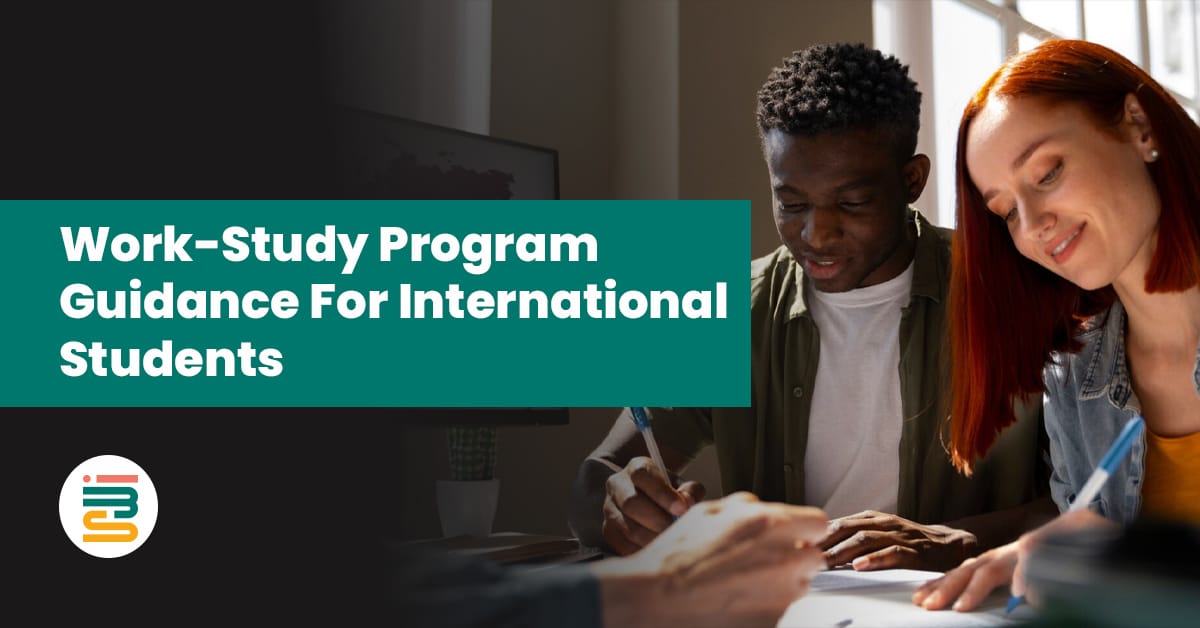For many international students, studying abroad is an exciting journey filled with new experiences, but it often comes with the challenge of managing finances. With tuition fees, rent, food, and travel expenses, it can feel overwhelming at times. This is where work-study program guidance for international students becomes so important. These programs offer a way to ease financial pressures while giving students the opportunity to gain work experience and develop valuable skills.
A work-study program allows students to work part-time during their studies, which can help cover some of those everyday costs. Whether you’re in the USA, UK, Canada, or Australia, understanding how these programs work can be a game-changer for your study abroad experience.
In this guide, we will provide you with everything you need to know about work-study program guidance for international students. From visa requirements to tips on balancing work and study, we’ve got all the information you’ll need to navigate the process smoothly. You’ll also learn about the many benefits of participating in these programs and how they can help you make the most of your time abroad. Let’s dive in and see how a work-study program can be the perfect fit for you.
What is a Work-Study Program
A work-study program is a type of financial assistance that allows students to work part-time while they study. This can be an excellent option for international students who want to ease the financial burden of tuition fees, living expenses, and other costs associated with studying abroad.
The goal of a work-study program is to help students gain work experience, develop professional skills, and earn money to support their education. Most of these programs are designed to be flexible, ensuring that students can balance work and study without compromising their academic performance.
Benefits of Work-Study Programs for International Students
Participating in a work-study program can offer numerous benefits. Below are some of the top advantages of taking part in these programs:
- Financial Support
One of the biggest reasons international students opt for work-study programs is the financial assistance they provide. By working part-time, students can cover essential expenses like rent, food, books, and transportation, reducing the financial stress that often comes with studying abroad.
- Work Experience
Another significant benefit of work-study programs for international students is the opportunity to gain valuable work experience. Many international students face challenges in finding employment in their host country, especially if they lack work experience or are unfamiliar with the job market. A work-study program allows students to gain experience relevant to their field of study, which can enhance their resume and improve their chances of securing full-time employment after graduation.
Curious about the advantages of pursuing your studies overseas? Reach out to IBS Consulting and book your FREE consultation to learn more!
Book Your Free Consultation
- Networking Opportunities
Through a work-study program, students have the chance to build their professional network. Networking is crucial for career development, and by working in different roles, students can meet professionals and peers who can provide guidance, job referrals, and career advice.
Eligibility Criteria for Work-Study Programs
To participate in a work-study program, international students must meet certain eligibility requirements. These can vary depending on the country, but here are some general criteria you can expect:
- Academic Requirements
Typically, students must maintain a minimum GPA (Grade Point Average) to qualify for a work-study program. While the GPA requirement varies by institution, it’s generally a good idea to keep your grades up to ensure eligibility for these opportunities.
- Visa and Permit Conditions
International students must also comply with the visa and work permit regulations of the host country. In most cases, students can only work a limited number of hours per week during the academic year. This is typically around 20 hours per week during the semester, though it may vary by country or program.
For example, students on a US F-1 visa may be allowed to work 20 hours per week on campus during the semester and full-time during breaks. However, students must ensure they have the correct work authorization to avoid any visa violations.
Top Countries Offering Work-Study Programs
Several countries offer excellent work-study programs for international students, each with its unique benefits and requirements. Here’s a breakdown of the top destinations for international students:
- United States
In the US, the work-study program is widely available to international students who hold an F-1 visa. These programs are typically offered through federal or institutional funding, and students can apply for positions on campus. The US government limits the number of hours students can work, usually 20 hours per week during the school term.
- Canada
Canada is another popular destination for international students. Work-study programs for international students in Canada are available through the country’s Post-Graduation Work Permit (PGWP) and other student work visas. International students on study permits are allowed to work up to 20 hours per week during the semester and full-time during breaks. Canadian universities also offer on-campus work-study jobs.
- United Kingdom
The UK allows international students to work part-time while studying under the Tier 4 student visa. Work-study programs in the UK can provide opportunities to work up to 20 hours per week during the academic term and full-time during holidays. Many UK universities also offer on-campus work opportunities to help students gain experience and earn extra money.
- Australia
Australia offers various work-study opportunities for international students under the Subclass 500 visa. Students in Australia can work up to 40 hours per fortnight during the academic term and unlimited hours during semester breaks. Additionally, many Australian universities have partnerships with local employers to help international students find work-study opportunities.
Read More: The top options to study data science in the USA
Work Permit Regulations and Restrictions
International students must be aware of the work-study visa requirements for international students and the work permit regulations in the country where they are studying. These rules are often specific to each country, so it’s essential to understand the regulations that apply to your situation.
- Working Hours for International Students
In most countries, there are strict regulations on the number of hours international students can work during the semester. It’s typically limited to 20 hours per week. However, during holiday periods or breaks, many students are allowed to work full-time.
Interested in learning more about the benefits of studying abroad? Call IBS Consulting to schedule a FREE consultation right away!
Book Your Free Consultation
- Penalties for Non-Compliance
Failing to comply with work-study visa restrictions can result in penalties, including losing your student visa or being barred from working in the future. It’s crucial to follow the rules to avoid these risks and maintain your legal status as an international student.
How to Apply for a Work-Study Program
Applying for a work-study program can be a straightforward process, but it’s important to follow the steps carefully. Here’s a step-by-step guide to help you apply:
- Research Available Opportunities
Start by researching work-study opportunities available at your chosen university or institution. Many schools have dedicated pages on their websites with information about work-study programs and the application process. Make sure to check eligibility criteria, deadlines, and available positions.
Read More: Colleges in Alberta for international students
- Prepare Your Application Documents
You’ll need to prepare several documents for your work-study application, such as:
- Your resume or CV
- A cover letter
- Your student visa or permit information
- Proof of academic performance (e.g., GPA)
- References (if required)
- Submit Your Application
Once your application is complete, submit it by the deadline. Be sure to follow any specific instructions outlined by the university or institution to ensure that your application is considered.
- Attend Interviews
Some work-study positions may require an interview. Be prepared to discuss your skills, experience, and why you are interested in the position. Practice common interview questions to help you feel confident.
Balancing Work and Study as an International Student
Managing both work and study can be challenging, but with proper planning, it is possible to achieve a good balance. Here are some tips for managing your time effectively:
Read More: Masters in public health Canada
- Time Management Strategies
- Create a schedule: Plan your study and work hours in advance to ensure you don’t overcommit yourself.
- Prioritize tasks: Focus on your most urgent tasks first, whether they are work-related or academic.
- Set realistic goals: Avoid overloading yourself with too many hours at work or too many assignments at once.
- Tools and Resources
Several tools can help you manage your time effectively:
- Calendar apps like Google Calendar can help you schedule your work and study hours.
- Time-tracking apps can help you monitor how you spend your time and avoid procrastination.
Common Challenges in Work-Study Programs and Solutions
While work-study programs for international students offer great opportunities, there are some challenges that students may face. Here are a few common issues and tips for overcoming them:
- Burnout
Working while studying can be exhausting. Make sure to take breaks, get enough sleep, and engage in activities that help you relax.
- Workplace Discrimination
Unfortunately, some international students face discrimination in the workplace. If you encounter any issues, report them to your school’s student services or HR department.
- Cultural Barriers
Adjusting to a new culture can be difficult, especially when it comes to communication styles or workplace norms. Be patient with yourself, and seek help from peers or mentors if needed.
Read More: These are the universities in Canada with cheap fees
FAQs on Work-study program guidance for international students
- Can I work full-time as an international student?
No, international students are generally allowed to work up to 20 hours per week during the academic term. However, you can work full-time during holidays.
- How do I find a work-study job?
Check your university’s career services or work-study office for available positions. You can also look for on-campus job listings online.
- Do I need a special visa for work-study?
Yes, you’ll need a student visa that allows you to work part-time while studying. Be sure to check the specific visa requirements for your country.
Read More: Top study abroad tips for Nigerian students
Conclusion
Work-study program guidance for international students is essential for anyone planning to study abroad while also gaining valuable work experience and financial support. Understanding the international student part-time work rules is crucial, as it varies by country. Each country has its own regulations on how many hours you can work and what types of jobs are allowed under a work-study visa. For example, in countries like the US and Canada, international students can work up to 20 hours per week during school terms. It’s important to research work-study visa requirements for international students thoroughly to ensure you comply with these rules.
>Contact us
Moreover, finding the best work-study programs for international students with no experience is possible, but it requires a bit of effort. Look for programs that support students without previous work experience, offering entry-level roles. By managing your time well and applying early, you can balance how to balance work and study as an international student effectively. For expert assistance, consider booking an appointment with IBS Consulting for personalized guidance to help you navigate your study abroad journey. They offer expert advice on how to succeed in work-study program guidance for international students and ensure you meet all necessary visa and job requirements.





